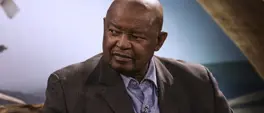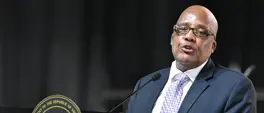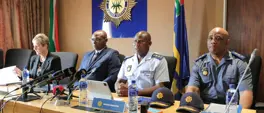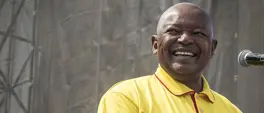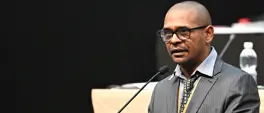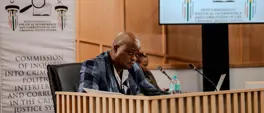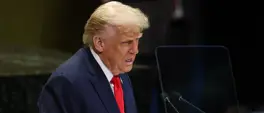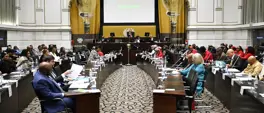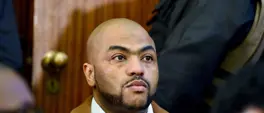CHARLES MATSEKE | Senzo Mchunu seems unfazed by the Madlanga commission of inquiry
Charles Matseke
7 October 2025 | 9:04"Mchunu’s upcoming appearance before the ANC Integrity Commission will test this duality. Should the party enforce its “step-aside if accused” policy, it risks detonating its fragile balance in KZN, a province already drifting towards tribal realignment."
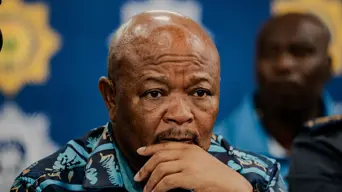
Police Minister Senzo Mchunu (far right) is accompanied by Gauteng Premier Panyaza Lesufi to address the Soshanguve residents after the murder of at least six community patrollers. Picture: Sphamandla Dlamini/EWN
While the Madlanga Commission of Inquiry unravels the anatomy of South Africa’s policing crisis dragging before it generals, ministers, and ghosts of institutional betrayal, Senzo Mchunu appears unbothered, almost rehearsed in his detachment.
As damning testimonies pour in implicating him in political interference and structural decay, Mchunu has chosen a different theatre of politics: the funerals, tombstone unveilings, and provincial gatherings of KwaZulu-Natal, where memory, mourning, and myth converge into power.
In these spaces, he re-authors himself not as an accused minister but as a cultural custodian speaking Zulu, quoting scripture, invoking forgiveness constructing a parallel legitimacy that neither subpoenas nor commissions can easily penetrate. To the casual observer he is performing grief; to the trained eye, he is performing survival.
Since mid-September 2025, Lieutenant General Nhlanhla Mkhwanazi has delivered testimony implicating Mchunu in political interference, ties to criminal syndicates, and the disbandment of the KwaZulu-Natal Political Killings Task Team (PKTT).
Mkhwanazi alleged that Mchunu personally pressured him to dissolve the task team a move critics interpret as shielding political actors from accountability. National Commissioner Fannie Masemola supported this version, accusing Mchunu of “total encroachment” into police operational matters.
In response, President Cyril Ramaphosa placed Mchunu on special leave, appointing Prof. Firoz Cachalia as acting minister. Yet even as the commission digs into what it calls “the capture of the security cluster,” Mchunu’s demeanor signals a man not on trial, but on tour.
He has opted to return to the people particularly the Zulu constituencies that anchor his power where his reputation is being reframed, one eulogy at a time.
In KwaZulu-Natal, Mchunu’s calendar reads like a pilgrimage through ancestral memory. At the unveiling of the tombstone of the late struggle stalwart Nokuhamba Nyawo in Machobeni, Ngwavuma, he delivered a eulogy entirely in Zulu an intentional gesture that blends empathy with strategy.
The use of language here is not mere cultural pride it is political code. By speaking exclusively in Zulu, Mchunu reclaims emotional territory and projects authenticity within the Zulu nationalist imagination that has long defined KZN’s political heartbeat.
He has since appeared at multiple funerals, ANC provincial events, and lectures, often repeating one crucial refrain: “Mistakes do happen.”
The quote, borrowed from Alexander Pope’s aphorism “to err is human,” is not a confession it’s a recalibration. Through it, Mchunu transforms guilt into humility and converts political indictment into a shared human fallibility. It’s a subtle exercise in reframing corruption as error, and misjudgment as empathy.
CHARLES MATSEKE | Police inquiry: The uniform is compromised and so is the response
CHARLES MATSEKE | The Madlanga Commission: South Africa’s last stand against elite impunity
In Robert Greene’s The 48 Laws of Power, this tactic mirrors Law 4: “Always Say Less Than Necessary.” Silence here becomes strategy. Ambiguity becomes armour. By refusing to over-explain, Mchunu leaves both the public and the commission uncertain about what is genuine remorse and what is political choreography.
Equally relevant is Law 25: “Re-create Yourself.” Having been stripped of his ministerial authority, Mchunu is re-emerging as something else entirely a cultural symbol rather than a political casualty. This rebirth allows him to retain influence through performance rather than position.
Make no mistake Mchunu is no peripheral player. A veteran of the CR17 campaign, he remains embedded in the architecture of Ramaphosa’s factional matrix. Yet he also commands grassroots loyalty in KZN a province where the ANC’s moral decline and the MK Party’s rise have created fertile ground for the politics of grievance and nostalgia.
With the Local Government Elections due next year, the 5th National General Council on the horizon, and the 2029 general electionsalready shaping the succession debate, Mchunu’s quiet campaign of cultural reaffirmation becomes strategic.
His public appearances serve as a counter-narrative to the commission’s proceedings a reminder to KZN voters that he, unlike the bureaucrats in Pretoria, still speaks their language, still buries their dead, and still walks among them.
Mchunu’s upcoming appearance before the ANC Integrity Commission will test this duality. Should the party enforce its “step-aside if accused” policy, it risks detonating its fragile balance in KZN, a province already drifting towards tribal realignment.
To discipline Mchunu is to provoke the Zulu nationalist sentiment that the ANC has never fully tamed, a sentiment that once propelled Jacob Zuma to power and continues to haunt Luthuli House.
Mchunu, like Zuma before him, is converting scandal into solidarity. His leverage stems not only from his cultural fluency but from his institutional influence: as police minister, he reportedly ordered the sealing of the Hawks’Phala Phala investigation, shielding “number one.”
For the Ramaphosa administration, alienating Mchunu could thus open two fronts, one legal and the other, political. As such, he remains both liability and leverage.
The ANC’s KZN problem is existential. It’s a province that resists central control, a political landscape where liberation history, ethnicity, and patronage merge into combustiblepopulism.
Zuma’s presidency once sought to solve it by localizing power; Ramaphosa’s tenure has only deepened the divide. Mchunu now weaponizes that same paradox: he is both insider and outsider, nationalist and technocrat, accused and adored.
The by-elections have already foreshadowed a political reconfiguration the MK Party’s dominance in KZN is not a blip; it’s a signal. Should Mchunu fall, his constituency may rally behind a narrative of persecution by the “Pretoria elite.”
The ANC, desperate to retain symbolic coherence, may prefer containment over confrontation soft-pedalling discipline to preserve the illusion of unity.
Further cementing his political reach, Mchunu’s name has appeared in Patrice Motsepe’s strategic slate as potential Deputy President, aligning him with Ramaphosa’s familial orbit.
As analyst Prince Mashele noted on the SMWX Podcast, this continuity is designed to ensure post-presidency protection for Ramaphosa an unspoken guarantee of safety from future prosecutions. Mchunu, therefore, is not merely fighting for himself; he’ part of the insurance policy of an entire political order.
In Robert Ludlum’s The Bourne Identity, Jason Bourne survives not by confrontation, but by disguise by becoming unreadable, invisible, and underestimated. Mchunu’s strategy echoes that ethos. Rather than engage the commission’s accusations head-on, he has vanished into cultural landscapes where the language of law gives way to the language of belonging.
He is shapeshifting: from minister to mourner, from technocrat to traditionalist, from the accused to the empathetic.
This is not retreat; it’s recalibration.
Bourne’s survival depended on knowing when to disappear so does Mchunu’. His invisibility is his resistance. His silence is his power.
The Madlanga Commission may yet produce a devastating report on the corrosion of South Africa’s justice system. But its political effect depends not only on evidence it depends on narrative.
Mchunu, by embedding himself in the emotive politics of culture and ritual, is constructing a shield stronger than any legal defence: the legitimacy of belonging.
He is not fighting the commission in the courtroom of law but in the court of sentiment. In a country where political memory is performed more than preserved, Mchunu’s survival may well be decided not by judges, but by mourners.
To the legal mind, he is under scrutiny.
To the political mind, he is adapting.
To the Zulu heart, he is returning home.
And in that contradiction lies the brilliance and danger of Senzo Mchunu’s political theatrics: a man unfazed by the storm because he has learned to dance in the rain.
Charles Matseke (MPhil in Politics and International Relations) is a researcher and writer with a keen interest in contemporary political dynamics. His research focuses on electoral politics, foreign policy analysis, and international relations, with a particular emphasis on the Global South and Africa's role in global affairs.
Get the whole picture 💡
Take a look at the topic timeline for all related articles.
Trending News
More in Opinion
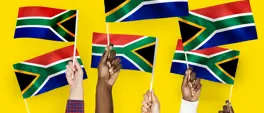
3 March 2026 11:40
Who belongs in South Africa? UCT philosopher weighs in on identity and ownership
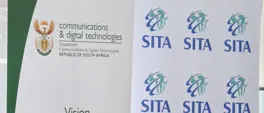
2 March 2026 11:05
TLALI TLALI |Mandate, money and accountability - What the government website debate really reveals

27 February 2026 11:00
JAMIL F. KHAN | Human rights last on the list for global leadership agenda
